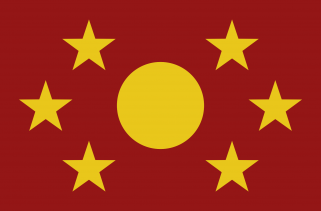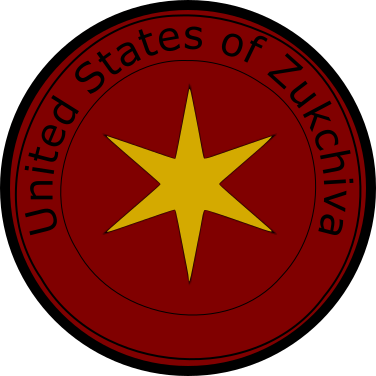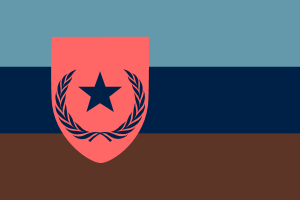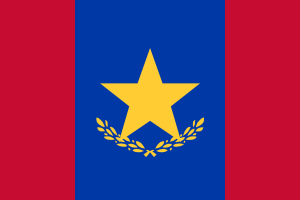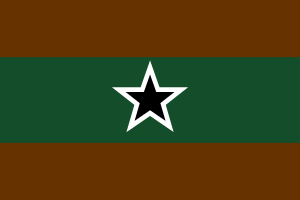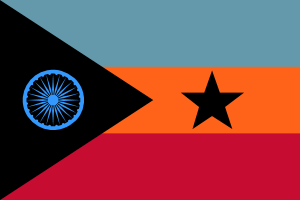OFFICIAL CONSTITUTION OF THE UNITED STATES OF ZUKCHIVA
Preamble:
We, the people of Zukchiva, to form a new and perfect nation, to promote the general Welfare, and to provide liberty, freedom, and protection for its citizens and culture, and to defend the homeland in times of war, declare this to be the Constitution of the United States of Zukchiva.
Article I
Section 1:
The government of Zukchiva shall not remove the establishment of any religion, or thereof the right to freedom of speech of the general public or the press, or the right for people to assemble and to petition the government of any grievances.
Section 2:
The Government of Zukchiva shall not discriminate any of the peoples of Zukchiva in any matter, and all races and peoples are subject to the same laws and the same rights. The slavery of any races is forbidden in Zukchiva.
Section 3:
The people of Zukchiva are allowed the possession of weapons in the case of self-defense to protect their families, homes, and their state.
Section 4:
Law enforcement are hereby not allowed to search any individual’s home or possesions without the possession of a Search Warrant which shall not be given unless the reason is justified. Law enforcement must tell the owner of such items what and why those items are being seized and searched.
Section 5:
The people of Zukchiva are allowed to deny and reject any soldier wanting to take residence in their homes even with government backing.
Section 6:
Criminals have the right to be treated as innocent unless proven otherwise. Criminals can only be tried and charged twice for the same crime if new evidence is found to appear since the first trial. Criminals will also be able to keep all belongings that they are able to manage and will not be forced to testify against themselves. They shall also have a fair and fast trial, know why they are being tried, and have witnesses and lawyers to defend them in court. There shall be no cruel nor unusual punishment and no excessive bail.
Section 7:
All citizens of Zukchiva have the right to vote in all elections. Aliens are denied the right to vote in any election unless able to provide sufficient proof of living in Zukchiva since last President’s election. The government is not able to take away the voting rights of 20 year olds and above. All citizens below the age of twenty are denied the right to vote in national elections.
Article II
Section 1:
The full power of the legislative branch shall go to the ordained House of Representatives of Zukchiva.
Section 2:
The Representatives in the House shall be elected on every Second Year by the people Of Zukchiva, and shall be able to serve only two full terms.
No person shall become a representative unless having obtained the age of 25 years, living in Zukchiva for six years as a citizen, and when elected shall be resident of the state they have been elected to represent for one full year.
At any given time only sixty Representatives can make up the body of the house. Each state shall be able to elect ten representatives for a term of two years.
Whenever vacancies in the House are found, the President has the ability to provide Writs of Election to fill up the seats until the next term. In cases where the President is unable to do so, the people of Zukchiva will hold an election to decide the New Representatives. These Writs of Election grant the person who receives them not to count the term as under the term requirement.
Section 4:
The state advisors shall disclose the place of the elections for the House, unless otherwise changed by the federal legislative.
Section 5:
The House is hereby given the Power to pass taxes, formulate and pass laws through the system, and to make necessary changes to the Constitution as needed with the majority of state vote. The House also has the power to start the Impeachment process with a majority vote.
The House has the ability to ignore any law as chosen and the ability to pass a law even if the President does not sign the law into circulation with a two thirds vote majority of bypassing the President.
The House has the ability to begin the Impeachment process to remove the President in case of criminal acts. The Impeachment process can only begin in two thirds of the House vote to impeach the President. The Vice President will become Acting President as the current President is tried. Impeachment removes the President from the office and denies him the right to participate in any government official positions.
Section 6:
With agreement of all states, the state legislative is made up of five advisors who have a term of three years.
Advisors have the power to formulate taxes, pass state laws, and make changes to the state constitution as mentioned by their respective states.
All decisions made by state advisors must abide by the federal Constitution and laws. Anything going against federal rule will not be considered valid.
State advisors shall be voted by the people, and the place of election will be decided by state legislation before the end of the term.
Section 7:
Federal and state legislative can vote through any methods seen fit to pass laws, taxes, or war decisions. The voting methods have to not discriminate any Representative or Advisor for their race, religion, or political party.
Article III
Section 1:
The executive power of the government shall be vested in a President of the United States of Zukchiva. He shall remain in his role for the term of four years and can only server two terms, and will be elected at the same time as the Vice President.
On January 31st, the people of Zukchiva shall vote for the next President in their states. All votes will be gathered on the 20th of February. The President will officially become the next President after this day. On the day of the Ceremony, the last President will step down and give up his office to the new President.
No person who is not a citizen of Zukchiva who is not above the age of 30 years, and has not lived in the United States of fourteen years shall not be eligible to be President of The United States Of Zukchiva.
In the case of the death, removal, or resignation of the President, then the Vice President shall hold the Office until the next term. If the Vice President is thus removed, dies, or resigns from office, the House of Representatives shall vote upon a member of their own to take the place of President for the rest of the term.
The President shall, at stated Times, receive for his Services, a Compensation, which shall neither be increased nor diminished during the Period for which he shall have been elected, and he shall not receive within that Period any other Emolument from the United States, or any of them.
Before he enter on the Execution of his Office, he shall take the following Oath or Affirmation:-“I do solemnly swear (or affirm) that I will faithfully execute the Office of President of the United States of Zukchiva, and will to the best of my Ability, preserve, protect and defend the Constitution of Zukchiva.”
Section 2:
The President shall be Commander in Chief of the Army,Navy, and Airforce of the United States, and of the Militia of the six States, when called into the actual Service of the United States; he may require the Opinion, in writing, of the principal Officer in each of the executive Departments, upon any Subject relating to the Duties of their respective Offices, and he shall have Power to Grant Reprieves and Pardons for Offences against the United States, except in Cases of Impeachment.
With the consent of the House, the President may make treaties, shall appoint Ambassadors, other public Ministers and Consuls, Judges of the supreme Court, and all other Officers of the Six States, whose Appointments are not herein otherwise provided for, and which shall be established by Law: but the Congress may by Law vest the Appointment of such inferior Officers, as they think proper, in the President alone, in the Courts of Law, or in the Heads of Departments.
Section 3:
He shall from time to time give to the House Information on the State of the Union, and recommend to their Consideration such Measures as he shall judge necessary and expedient; he may, on extraordinary Occasions, convene the House; he shall receive Ambassadors and other public Ministers; he shall take Care that the Laws be faithfully executed, and shall Commission all the Officers of the United States.
Section 4:
The President, Vice President and all Civil Officers of the United States, shall be removed from Office on Impeachment for, and Conviction of, Treason, Bribery, or other high Crimes and Misdemeanors.
Article IIII
Section 1:
The judicial Power of the Six States, shall be vested in one supreme Court, and in such inferior Courts as the Congress may from time to time ordain and establish. The Judges, both of the supreme and inferior Courts, shall hold their Offices during good Behaviour, and shall, at stated Times, receive for their Services, a Compensation, which shall not be diminished during their Continuance in Office.
Section 2:
The judicial Power shall extend to all Cases, in Law and Equity, arising under this Constitution, the Laws of the Six States, and Treaties made, or which shall be made, under their Authority;-to all Cases affecting Ambassadors, other public ministers and Consuls;-to all Cases of admiralty and maritime Jurisdiction;-to Controversies to which the United States shall be a Party;-to Controversies between two or more States;-between a State and Citizens of another State;-between Citizens of different States;-between Citizens of the same State claiming Lands under Grants of different States, and between a State, or the Citizens thereof, and foreign States, Citizens or Subjects.
In all Cases affecting Ambassadors, other public Ministers and Consuls, and those in which a State shall be Party, the supreme Court shall have original Jurisdiction. In all the other Cases before mentioned, the supreme Court shall have appellate Jurisdiction, both as to Law and Fact, with such Exceptions, and under such Regulations as the Congress shall make.
The Trial of all Crimes, except in Cases of Impeachment, shall be by Jury; and such Trial shall be held in the State where the said Crimes shall have been committed; but when not committed within any State, the Trial shall be at such Place or Places as the Congress may by Law have directed.
Section 3:
Treason against the Six States, shall consist only in levying War against them, or in adhering to their Enemies, giving them Aid and Comfort. No Person shall be convicted of Treason unless on the Testimony of two Witnesses to the same overt Act, or on Confession in open Court.
The House shall have Power to declare the Punishment of Treason, but no Attainder of Treason shall work Corruption of Blood, or Forfeiture except during the Life of the Person attainted.
Article V
Section 1:
Full Faith and Credit shall be given in each State to the public Acts, Records, and judicial Proceedings of every other State. And the House may by general Laws prescribe the Manner in which such Acts, Records and Proceedings shall be proved, and the Effect thereof.
Section 2:
The Citizens of each State shall be entitled to all Privileges and Immunities of Citizens in the Six States.
A Person charged in any State with Treason, Felony, or other Crime, who shall flee from Justice, and be found in another State, shall on Demand of the executive Authority of the State from which he fled, be delivered up, to be removed to the State having Jurisdiction of the Crime.
No Person held to Service or Labour in one State, under the Laws thereof, escaping into another, shall, in Consequence of any Law or Regulation therein, be discharged from such Service or Labour, but shall be delivered up on Claim of the Party to whom such Service or Labour may be due.
Section 3:
The United States shall guarantee to every State in this Union a Republican Form of Government, and shall protect each of them against Invasion; and on Application of the Legislature, or of the Executive (when the Legislature cannot be convened) against domestic Violence.
Article VI
In the case of need, the House as the ability to call upon the Six States to declare the vote for a change in the Constitution. The state legislators shall come together, and the Admendment shall pass if four out for or more of the states vote in favor for the amendment proposal.
Article VII
This Constitution, and the Laws of the Six United States which shall be made in Pursuance thereof; and all Treaties made, or which shall be made, under the Authority of the States, shall be the supreme Law of the Land; and the Judges in every State shall be bound thereby, any Thing in the Constitution or Laws of any state to the Contrary notwithstanding.
The Representatives before mentioned, and the Members of the several State Legislatures, and all executive and judicial Officers, both of the United States and of the six States, shall be bound by Oath or Affirmation, to support this Constitution; but no religious Test shall ever be required as a Qualification to any Office or public Trust under the Six States.
Article VIII
On the Day of Our Lord, 2018 on the fifteenth of January, all six states have voted to make this Constitution legal and recognized.
